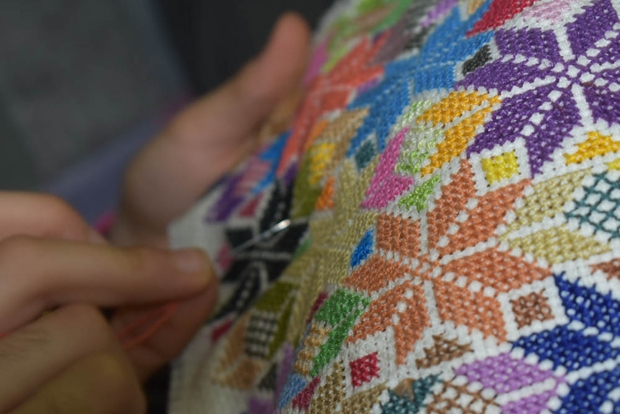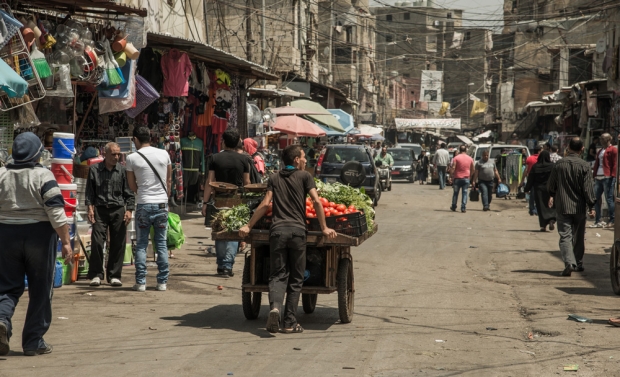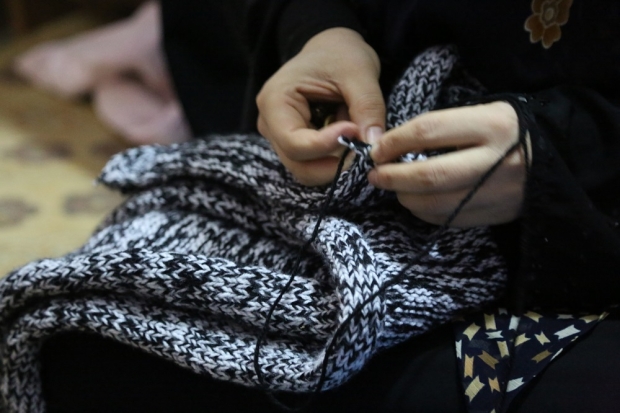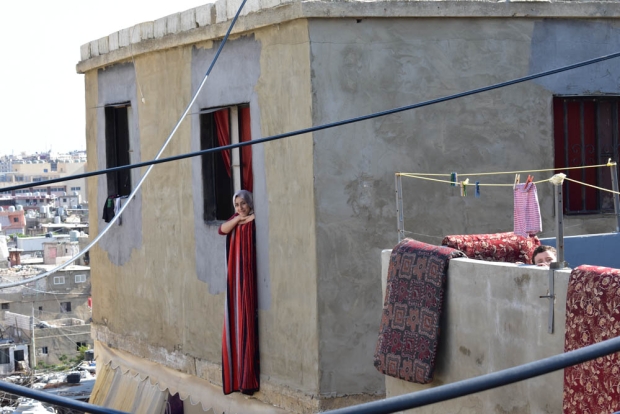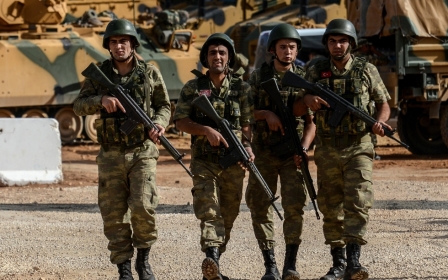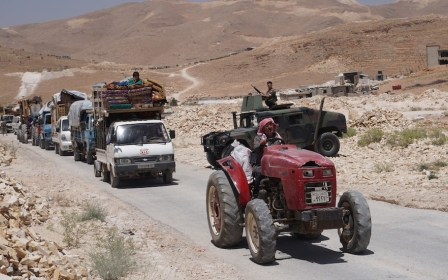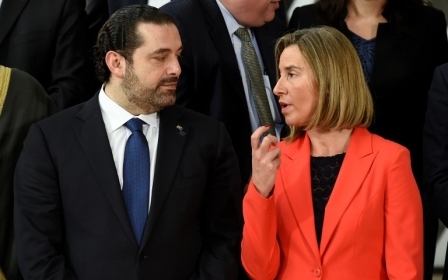A stitch of hope for Syrian refugee women
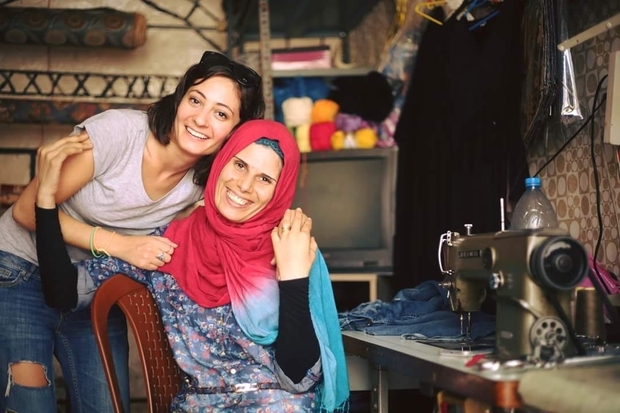
Halifax, Canada - Jouhayna Fadel and her family stayed as long as they could in their hometown of Daraa, the birthplace of Syria's revolution.
But after narrowly escaping an air strike that destroyed their modest, two-bedroom home in 2013, Fadel, a married mother of five, knew it was time to leave. The house burned to the ground with everything they owned inside.
“All I was thinking about was how did we survive this, and how are we going to start from zero?” she said.
All I was thinking about was how did we survive this, and how are we going to start from zero?
- Jouhayna Fadel, Tight-Knit Syria artisan
Close to five years later, as Syria's war grinds on, she and her family live as refugees inside the dense warren of Lebanon's Shatila camp. Rent is high and morale is low.
To help supplement her husband's earnings from unreliable construction jobs, Fadel last year turned to crochet and embroidery, joining up with a Toronto-based online sales platform called Tight-Knit Syria.
In addition to the extra cash - about $100 a month, which helps to pay the $350 rent on the small four-room flat they share with another family - the work has made Fadel “more confident and social,” she said. “It has also reminded me of life without war.”
'A story we weren't hearing'
Since Syria's civil war erupted seven years ago, sparked by a revolt against President Bashar al-Assad's rule, more than half a million people have been killed and millions more have fled to neighbouring Turkey, Jordan and Lebanon, where they face widespread unemployment and social stigma.
The United Nations refugee agency calls Syria “the biggest humanitarian and refugee crisis of our time”.
We've heard women imply that they go into sort of a meditative state, where they can reflect on their trauma and ride through it, and take the time to confront it
- Dana Kandalaft, Tight-Knit Syria founder
Dana Kandalaft, the 28-year-old Syrian-Canadian founder of Tight-Knit Syria, had not visited the country in years when the war erupted. Born and raised in Mississauga, a sprawling suburban community on the outskirts of Toronto, her understanding of the conflict was filtered through the opinions of relatives in Damascus and the media, leaving her confused and disconnected.
“I understood, okay, there are rebels and extremism, but I also felt like there was a story that we weren’t hearing,” Kandalaft said.
The reality hit home for her five years ago, just months before Fadel's house disappeared in flames.
Kandalaft decided to go even deeper towards the heart of the conflict, risking a trip across the Turkey-Syria border to the Olive Tree displacement camp. In this tiny slice of the country's north, the idea for Tight-Knit Syria was born.
These girls [and women] of all ages are growing up in the worst circumstances ever, and nonetheless have preserved their lust for life and creativity, which I think is something everybody can identify with
- Dana Kandalaft, Tight-Knit Syria founder
“I was wearing a knitted purse, and a little girl noticed the purse and basically started a frenzy around [it],” Kandalaft said. “She led me to her tent, where she later revealed a knitted dress that she had made herself.”
The girl told Kandalaft that an anonymous donor had given yarn to the women in the camp, but there was none left.
With that, Kandalaft swiftly returned to Toronto and started fundraising.
Coordinating with a Syrian aid worker on the ground, who used the funds raised to purchase new thread and yarn for the women, Kandalaft created a portal to sell their scarves and handbags online, with profits channelled back to the creators. Today, her company employs more than 50 women in northern Syria and Lebanon, with new batches of products introduced for sale biannually. Prices for the current collection range from $35 to $60, and on average, women earn $100 a month.
“We heard one woman say, 'When I'm knitting something, I can just feel all my energy go into that piece,'” she said. “We've heard women imply that they go into sort of a meditative state, where they can reflect on their trauma and ride through it, and take the time to confront it.”
A lust for life
It can be difficult, however, to maintain these skills while living in a refugee camp, where the focus is so often on finding the next meal.
“Most of these refugees or displaced persons are escaping either high degrees of violence and conflict ... or alternatively, the risk of being persecuted by either anti-government groups or the government itself,” said Sara Kayyali, a Syria researcher with Human Rights Watch. “Many of them have been detained, mistreated, tortured ... and when they get to the camps, the humanitarian situation is so bad that most humanitarian workers will focus on service provision first - making sure there’s shelter, food, water. Very rarely would the focus be on psychosocial services in a sustainable manner.”
Pursuing a craft can help to put more mental distance between refugees and their trauma, Kayyali said, while also lightening the economic load - an important factor in a context where financial troubles can fuel further destabilisation.
“A lot of the refugees that we meet in these camps are unemployed, frustrated, and have no prospects at all. That's the majority,” Kayyali said. “[One man told me], 'I can't open my own barbershop. I will never be my own boss.' And he decided to go back to Syria as a result of that.”
To date, Tight-Knit Syria has sold close to 10,000 scarves, vests, purses and wallets, earning thousands of dollars for their Syrian designers. The company ships to both Canada and the United States, and Kandalaft hopes to expand further. This month, she is competing to win funding through Shared Nation, a global resource-sharing network.
The power of this project, she believes, is in its simplicity. “These girls [and women] of all ages are growing up in the worst circumstances ever, and nonetheless have preserved their lust for life and creativity, which I think is something everybody can identify with.”
Life in limbo
Back at Shatila camp, Malak Bakkour remembers her own flight from Syria. With her three sons and three daughters in tow, she left her home in the fertile Aleppo countryside in 2014 and headed for Lebanon, where her husband had found work.
When I work, I don't think about the war and the Syrian crisis, and I forget some of my problems
- Malak Bakkour, Tight-Knit Syria artisan
When she left, the family's three-bedroom home, complete with the garden she loved, was still standing. But later “we learned that terrorist groups had taken over and taken whatever was left inside”. As battles raged between competing Syrian factions, their home was ultimately destroyed by bombs, Bakkour said.
“No one from our family was left in the village,” she said. "We all came to Lebanon."
Like Fadel, Bakkour says working with Tight-Knit Syria has helped her - at least in some small way - to cope with the creeping despair of a life in limbo.
“When I work,” she said, “I don't think about the war and the Syrian crisis, and I forget some of my problems.”
This article is available in French on Middle East Eye French edition.
New MEE newsletter: Jerusalem Dispatch
Sign up to get the latest insights and analysis on Israel-Palestine, alongside Turkey Unpacked and other MEE newsletters
Middle East Eye delivers independent and unrivalled coverage and analysis of the Middle East, North Africa and beyond. To learn more about republishing this content and the associated fees, please fill out this form. More about MEE can be found here.


